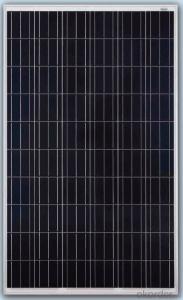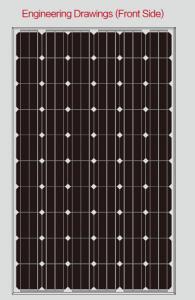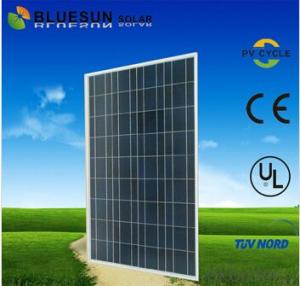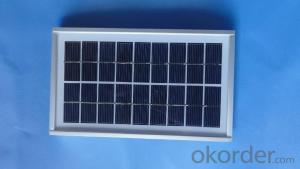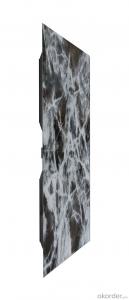140W/145W Solar Panel with TUV IEC MCS CEC IDCOL SONCAP Certificates
- Loading Port:
- Shanghai
- Payment Terms:
- TT OR LC
- Min Order Qty:
- 1000 watt
- Supply Capability:
- 100000000 watt/month
OKorder Service Pledge
OKorder Financial Service
You Might Also Like
- TUV IEC, MCS (UK), CE, CEC (Australia), INMETRO, IDCOL, SONCAP CERTIFIED
- [EU ANTIDUMPING DUTY-FREE]
- PROFESSIONAL SOLAR PANEL MANUFACTURER SINCE 2004
FEATURES
`Long Service Life
`High Efficency Solar Cells
`Special Aluminum Frame Design
`High Transmission,Low Iron Tempered Glass
`Advanced Cell Encapsulation
APPLICATIONS
`Solar power stations
`Rural electrification, Small home power systems
`Power supply for traffic, security, gas industry
`12V and 24V battery charging system
`Other industrial and commercial applications
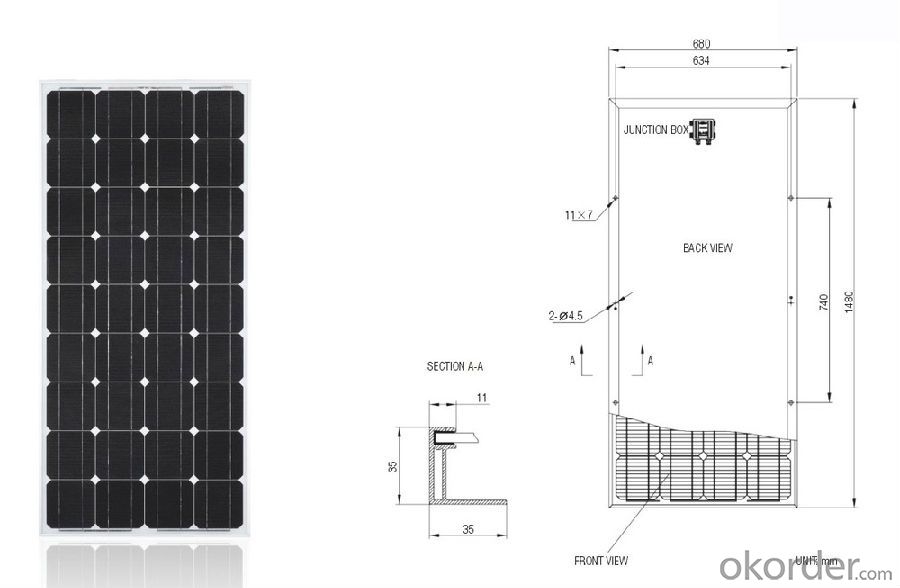
ELECTRICAL CHARACTERISTICS | ||||||
Model Number | KM130(6) | KM135(6) | KM140(6) | KM145(6) | KM150(6) | |
Maximum Power as per STC | Pmax(W) | 130 | 135 | 140 | 145 | 150 |
Power Tolerance | % | ±3% | ||||
Maximum Power Voltage | Vm(V) | 17.96 | 18.14 | 18.36 | 18.15 | 18.28 |
Maximum Power Current | Im(A) | 7.26 | 7.45 | 7.65 | 7.99 | 8.21 |
Open Circuit Voltage | Voc(V) | 21.6 | 21.74 | 21.96 | 21.72 | 21.9 |
Short Circuit Current | Isc(A) | 7.83 | 8.04 | 8.17 | 8.69 | 8.93 |
Maximum System Voltage | VDC | 1000 | ||||
Cell Efficiency | % | 15.0 | 15.5 | 16.1 | 16.7 | 17.3 |
Module Efficiency | % | 12.9 | 13.4 | 13.9 | 14.4 | 14.9 |
Cells per Module | Pcs | 36 | ||||
Cell Type | Monocrystalline silicon | |||||
Cell Size | mm | 156 x 156 | ||||
Bypass Diodes | Pcs | 10Amp, 2 pcs | ||||
Max. Series Fuse Rating | A | 10A | ||||
Temperature coefficient of Isc | %/°C | 0.05 | ||||
Temperature coefficient of Voc | %/°C | -0.35 | ||||
Temperature coefficient of power | %/°C | -0.47 | ||||
NOCT- Nominal operating cell temperature | °C | 47 ± 2 | ||||
Operating Temperature | °C | -40 ~ +85 | ||||
MECHANICAL CHARACTERISTICS | ||||||
Dimensions | mm | 1480 x 680 x 35 | ||||
Weight | Kg | 11.6 | ||||
Type of Junction Box | TUV certified, IP65 | |||||
Cable Type, Diameter | - | |||||
Connector | - | |||||
Tempered Glass | 3.2 mm, high transmission, low iron | |||||
Packing
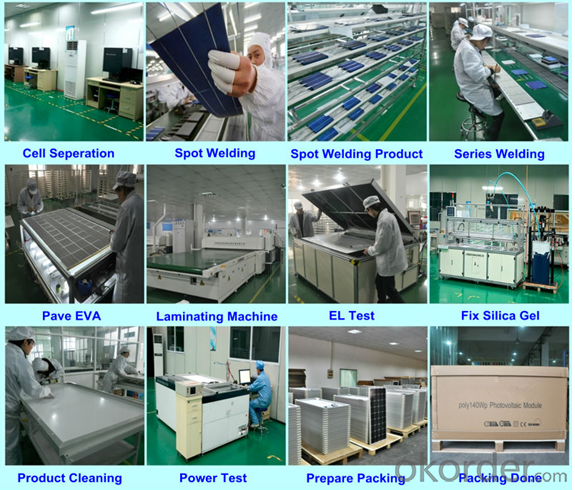
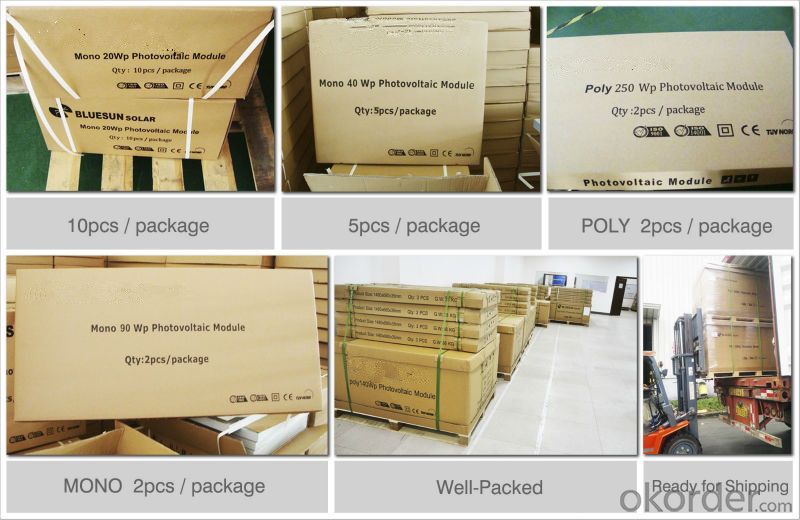
FAQ
1. What kind of Solar Cells does it have
---poly crystalline 156*156mm and 125*125mm or mono 125*125mm and 156*156mm
2. Is the front panel Glass or Plastic
---Tempered glass 3.2mm thickness or adjust to what you need, Light transmittance up to 95%.
3. Does it meet Europe Standards for Solar Energy
---This is TUV approval products, all the producing procedure apply TUV&UL.
4. What is the Efficiency level
--- Between 16-18.9% for solar cells.
5. What is the Nominal Voltage
--- 18v 20v 24v 36v 30v 48v , and so on, we can adjust to what you need.
6. What is the Warranty Period, How many years?
Power efficiency warranty:
---90% in 10 years; 80% in 25 years.
- Q:Can solar panels be installed on golf courses or recreational facilities?
- Yes, solar panels can be installed on golf courses or recreational facilities. These locations often have vast open spaces with ample sunlight, making them ideal for harnessing solar energy. Additionally, installing solar panels in these areas can help offset the energy demands of the facilities, reduce carbon emissions, and promote sustainability.
- Q:The average solar panel produces 0% of the energy that is put into it. What is happening to the other 90%? Is it being reflected or is it being obsorbed by materials that are not a part of the solar cell? Is it possible to one day have near 00% efficient solar cell technology?
- Unlikely that we gan get to near 00% efficiency, although there is room for improvement. In the meantime, don't pooh-pooh 0% efficiency. That's about the rate of energy transfer up a food pyramid, perhaps a little less at the solar to plant level. As this manages to provide the basis for most of life on earth, it's nothing to sneeze at. As far as the other 90% goes, I would guess that much of it is reflected.
- Q:Can solar panels be used in areas with high temperatures?
- Yes, solar panels can be used in areas with high temperatures. In fact, solar panels are designed to withstand a wide range of environmental conditions, including high temperatures. However, it's important to note that extreme heat can slightly reduce the efficiency of solar panels, but this reduction is usually minimal and does not significantly impact their overall performance. Additionally, proper installation and maintenance can help mitigate any potential heat-related issues.
- Q:Can solar panels be used for powering a hotel or hospitality establishment?
- Yes, solar panels can definitely be used to power a hotel or hospitality establishment. Solar energy is a reliable and renewable source of power that can be harnessed to meet the energy demands of such establishments. By installing solar panels, hotels and hospitality establishments can not only reduce their carbon footprint but also save on electricity costs in the long run. Moreover, advancements in solar technology have made it possible to store excess energy and use it during non-sunlight hours, ensuring a consistent power supply for the establishment.
- Q:how would you build a solar panel
- i'd go to the solar panel store and buy one. It would be /0 the cost of trying to build one in my HOME shop.
- Q:Can solar panels be installed on a hotel or hospitality facility?
- Yes, solar panels can be installed on a hotel or hospitality facility. In fact, many hotels and hospitality facilities are adopting solar energy as a sustainable and cost-effective solution. Solar panels can be installed on the rooftops, parking lots, or any available open space to generate clean and renewable energy for the facility's electricity needs. This not only reduces the carbon footprint but also helps in saving on energy bills in the long run.
- Q:What is the cost of installing solar panels?
- The cost of installing solar panels can vary depending on various factors such as the size of the system, the location, and any additional equipment or services needed. However, on average, the cost can range from $10,000 to $30,000 for a residential installation. It is important to get a personalized quote from a solar installation company to determine the exact cost for your specific needs.
- Q:Photo-Voltaic solar panels are very expensive. Most of a home's energy needs are for heating water, heating and air-conditioning. All of these can be met with thermal solar collectors which are much less expensive. The thermal solar panels would heat water stored in a hot water tank which then can be used as hot water, to heat the home, or as the heat source to a Lithium Bromide Absorption chiller to air-condition a home. With the base line needs met without expensive panels and without inefficient energy conversions, only a small Photo-Voltaic array would be needed for the remaining power needs and since those needs are variable, there would still be power to sell to the grid.
- That sounds good to me. I'm all for any kind of new energy as long as it's renewable and doesn't pollute the environment. I'm even a fan of solar water heating.
- Q:What is the impact of bird droppings on solar panels?
- Bird droppings can have a negative impact on solar panels as they can reduce the efficiency of the panels by blocking sunlight and reducing the amount of energy they can generate. Additionally, the acidic nature of the droppings can potentially damage the surface of the panels over time if not cleaned properly. Regular cleaning and maintenance are necessary to ensure optimal performance and longevity of solar panels in areas where bird droppings are prevalent.
- Q:where to find used solar panels?
- Used Solar Panels R Us
1. Manufacturer Overview |
|
|---|---|
| Location | |
| Year Established | |
| Annual Output Value | |
| Main Markets | |
| Company Certifications | |
2. Manufacturer Certificates |
|
|---|---|
| a) Certification Name | |
| Range | |
| Reference | |
| Validity Period | |
3. Manufacturer Capability |
|
|---|---|
| a)Trade Capacity | |
| Nearest Port | |
| Export Percentage | |
| No.of Employees in Trade Department | |
| Language Spoken: | |
| b)Factory Information | |
| Factory Size: | |
| No. of Production Lines | |
| Contract Manufacturing | |
| Product Price Range | |
Send your message to us
140W/145W Solar Panel with TUV IEC MCS CEC IDCOL SONCAP Certificates
- Loading Port:
- Shanghai
- Payment Terms:
- TT OR LC
- Min Order Qty:
- 1000 watt
- Supply Capability:
- 100000000 watt/month
OKorder Service Pledge
OKorder Financial Service
Similar products
New products
Hot products
Related keywords
